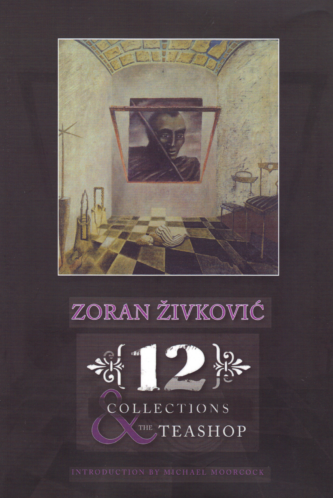 By ZORAN ZIVKOVIC (PS Publishing; 2007)
By ZORAN ZIVKOVIC (PS Publishing; 2007)
This 12 story collection, from the incomparable Zoran Zivkovic, explores the vagaries of collecting in fascinating and bizarre fashion. Here the collecting impulse manifests itself in a variety of methods utilized by just as many different characters, some of them supernaturally endowed and some not. Also explored are the attendant problems of collecting, such as the cost of acquiring the goods and where to store them.
Nearly all of the book’s collections involve death in some way, suggesting that hoarding may be rooted in anxieties about mortality. Note the character who, realizing his collecting will be permanently curtailed by his imminent death, vows to live forever!
The objects collected herein include fingernail clippings, autographs, newspaper articles, photographs, dreams with purple details, beautiful words, writers’ last stories and past days from peoples’ lives. The collecting theme extends to the book overall, which, as presented in a spiffy limited edition hardcover by PS Publishing, is itself imminently collectible.
Also included is a story called “The Teashop,” about a woman waiting for a train who enters a teashop. All sorts of interesting teas are listed on the menu, including one “made of stories.” This the woman orders, and receives a wide-ranging story related by several of the shop’s denizens: the tale concerns an executioner who abruptly resigns from his profession, as well as a nurse-turned-stuntwoman, a cook and ultimately the protagonist herself.
Note must also be made of the fine introduction by Michael Moorcock. He explores the relationship of Zivkovik’s fiction to the post-modernist tradition, and offers an intriguing (and likely accurate) speculation on the reasons behind one of Zivkovik’s more notable quirks: his lack of identifying detail in his characters (who often go unnamed) and locales. Moorcock’s speculation is that this tendency derives from the tyrannical political conditions under which the Serbian Zivkovic lives and writes (“Zivkovik, no supporter of Milosevic and the communists, probably instinctively learned the trick of creating substantial fiction which avoided antagonistic interpretation”). I might add that regardless of whatever political overtones Zivkovic’s writing may possess, its style and themes are imminently accessible and universal.
